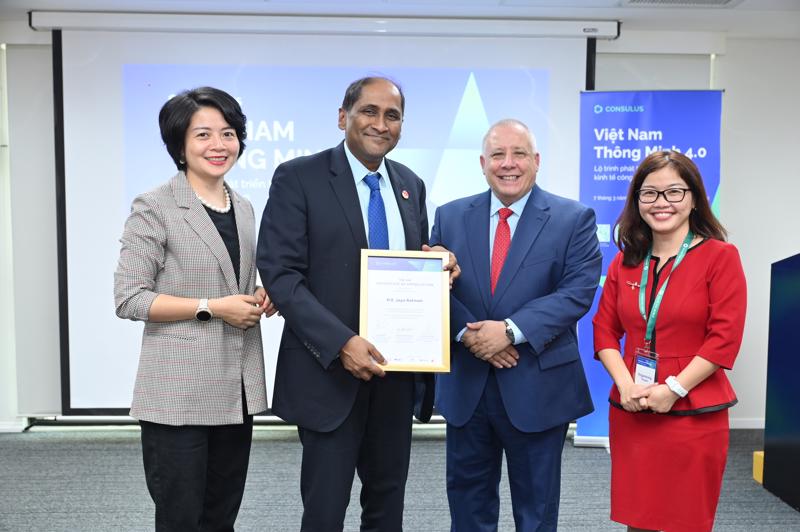On March 7, Consulus Vietnam announced the successful completion of a nationwide research project on Vietnam’s readiness for Industry 4.0, the results of which are presented in a White paper entitled “Smart 4.0 Vietnam, Roadmap toward a high-tech economy”.
The White paper was released in both English and Vietnamese by Consulus Vietnam, RMIT Vietnam, and the Hanoi Association for Women Entrepreneurs, in the presence of government agencies, business associations, and international development organizations at the Vietnam-Singapore Cooperation Center.
The paper gives an overall view of Vietnam’s economy through eight industry groups: education, banking and finance, IT-technology, manufacturing, medical/healthcare, real estate, hospitality/tourism, and international business, then deep dives into each industry group.
“The White paper affirms that Vietnamese companies possess inherent strengths in innovation that can transform their business models and gain a competitive edge in Industry 4.0,” said Ms. Helena Pham, Managing Director of Consulus Vietnam and co-author of the White paper. “Consulus Vietnam is dedicated to supporting Vietnamese business leaders in developing intellectual property and proprietary ‘Made in Vietnam’ technologies.”
The paper concludes with practical recommendations and suggestions for Vietnam to be more ready for Industry 4.0 towards becoming a high-tech economy, while consciously creating a systemic basis to tackle the challenges of Industry 5.0.
Professor Robert McClelland, Dean of the Business School at RMIT Vietnam, said it cooperates closely with industry through its Industry Advisory Board to ensure that its courses are aligned with industry demand and that its graduates are positioned to meet the needs of business.
“Our academics at RMIT and Industry Advisory Board members have cooperated strongly and, further, members of our Industry Advisory Board have worked hard to contribute to the Smart 4.0 Vietnam White paper launch, identifying how Vietnam could seize the vast opportunities given by Industry 4.0 as a shortcut to develop its digital economy,” Professor McClelland said.
As 2023 marks the 50th anniversary of diplomatic relations between Vietnam and Singapore and the 10th anniversary of the Vietnam-Singapore Strategic Partnership, Ambassador of Singapore to Vietnam, H.E. Jaya Ratnam, who graced the occasion as Guest of Honor, noted that the cooperative partnership between the two countries is forward-looking and has recently expanded to encompass a wide range of domains, including energy, carbon credits, and innovation.
Ambassador Ratnam also said that Singapore and Vietnam signed an MoU on a Green and Digital Economic Partnership last month, which provides an umbrella framework to bring cooperation to the next level in energy, sustainability, infrastructure, digital economy and innovation, and connectivity.
“I am therefore very pleased to be here for the launch of the Smart 4.0 Vietnam White Paper,” he told the gathering. “For us, it will be a valuable tool to shape our engagement to be more effective and impactful, especially as we accelerate cooperation in the digital economy, covering areas such as cybersecurity, cross-border data flows, smart cities, innovation, artificial intelligence, and digital payments.”
Following the official launch, a series of industry-specific workshops will be organized to transfer know-how, capabilities, and tools to companies in each industry group to address the current challenges and tap inherent strengths and opportunities to drive innovation and growth for themselves, the industry, and Vietnam as a whole.









 Google translate
Google translate